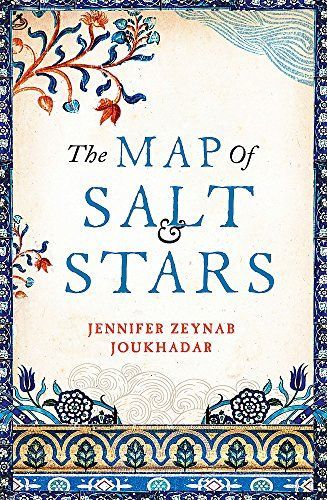
The Map of Salt and Stars
'Full of tension and love and danger. This is a beautifully told, magical novel about journeys and finding your way home.' STYLIST Nour has lost her father. She has also lost the place she was born in and now lives in the Syrian town of Homs, along with her sisters and mother. And so, by the fig tree in the garden, Nour whispers the stories her Baba once told her, so that the roots of the tree will carry those stories back to where her father is buried and he won't feel so alone. Her favourite is the story of Rawiya, a young girl from the twelfth century who left her home in search of adventure, dressed as a boy. But Syria is changing and it isn't long before protests and shelling destroy the peace of the quiet city. As Nour begins her own journey as a refugee, she draws strength and inspiration from the voyage of Rawiya, who became apprenticed to the famous mapmaker, Al Idrisi, and who battled mythical creatures and endured epic battles in the attempt to compile the most accurate map of the world ever made. THE MAP OF SALT AND STARS is a breathtakingly beautiful novel that illuminates the story of a country in turmoil, a tale of human resilience and the power of stories to transform. JUST some of the praise from readers of THE MAP OF SALT AND STARS: 'You know that wonderful feeling when you read the last page of a truly great story and then you clutch the book to your chest as if to hug the world within those pages? That's how I'm feeling right now.' Goodreads 4 star review 'A complex and multi-layered novel told in a rich atmospheric voice destined to be one of the most important works of 2018.' Goodreads 5 star review 'This stunningly written, heartbreakingly beautiful (but ultimately, hopeful) story is a rich, multilayered + sweeping saga... A beautiful melding of myth, grief, hope and persistence- I just loved this one.' Goodreads 4 star review 'A beautifully written debut novel about stories and storytelling that you won't soon forget. "Stories map the soul, in the guise of words." Goodreads 4 star review 'I seriously cannot recommend this book enough. I see fireworks: red, blue, purple, green, with a shower of golden stars. The Map of Salt and Stars is amazing. Please read this book.' Goodreads 5 star review 'The Map Of Salt And Stars is really such a fantastic read and once you have started it is impossible to stop.' Goodreads 4 star review 'There are parts that will make your heart stop and parts that will make it beat again.' Goodreads 5 star review 'I believe this book is to Syrian heritage what the Kite Runner is to Afghanistan. All in all, a great read.' Goodreads 5 star review 'Beautifully written with lush detail....stories will give you have a deeper understanding and appreciation that we are all maps and stories. It will also show you what home is and what home means.' Goodreads 5 star review
Reviews
hileahrious@hileahrious
altlovesbooks@altlovesbooks
Gillian Rose@glkrose
Stephanie Honour@stephonour
Sheila@duchess
Iween Suni@iweennn
Arwa El@aruajuanita
Sameer Vasta@vasta
Suzie@zieziereads
Peyton@districtreader
Francine Corry@booknblues
AnjB@aster
molly 📖@mollyyreads
Lizelle G@lizelle
Kaycee@kaycee
Rachel Kanyid@mccallmekanyid
Stephanie Ridiculous@stephanieridiculous
Zahia Saeed @zahiawrites
Kay Jamieson@kayjamieson
Elizabeth Moore@haddyaddy
Berit Akse@berit
Jessie@jraelew
Tamara Al-Qaisi-Coleman@tamaraalqaisi
Alexandria Wilkie@sandrylene